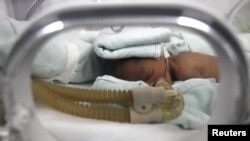Researchers have developed a powerful DNA-reading computer program that can diagnose potentially fatal genetic disorders in newborns in only two days, instead of the several weeks now required. The technology means that infants born with these disorders can receive immediate, life-saving treatment.
Doctors know of at least 3,500 diseases caused by a single defective gene. Most of the newborns who wind up in neonatal intensive care units are critically ill with one of these genetic disorders.
Treatments are available for about 500 of the diseases. But physicians often work against the clock. Some of these genetic disorders are not easy to diagnose on the basis of symptoms alone. Whole-genome sequencing -- scanning the newborn's DNA for suspect genes -- usually takes between four and six weeks, and many babies die before the test results are returned.
But Stephen Kingsmore, director of the Center for Pediatric Genomic Medicine at Children’s Mercy Hospital in Kansas City, Missouri, says new sequencing software developed by researchers casts a wide net over the entire human genome. That genome consists of 3 billion base pairs of DNA molecules. Only about 20,000 to 25,000 genes in every DNA strand code for particular physical traits and diseases.
The new software, Kingsmore says, makes a powerful DNA screening technology available for the first time to neonatal doctors.
“That goes from taking a drop of blood from the baby, receiving an order from a physician, all the way back to reporting the results back to that physician. We report [on] seven acutely ill babies in whom we performed this," he said. "And in six, we were able to provide a rapid molecular diagnosis.”
The software focuses on parts of the genome that are relevant to a particular symptom or symptoms, helping doctors to search for the possible cause of a baby's congenital disorder.
"We think this is going to transform the world of neonatology by allowing neonatologies practice medicine that [is] influenced by genomes. Until now, they have really had to practice medicine blindfolded," Kingsmore explained.
The so-called HIGH-Seq system, developed by the British company, Illumina, is not yet available outside Britain. For the study, researchers at Mercy Hospital sent DNA samples across the Atlantic for sequencing, and researchers in Britain sent the results back as digital files on CDs. Kingsmore says his center will receive a HIGH-Seq sequencing machine next month.
In addition to newborns, Kingsmore says investigators have begun running genetic tests on parents to help narrow the search for inherited disorders.
Researchers at Mercy Hospital hope eventually to make the DNA decoding tool available to doctors across the country.
An article by Stephen Kingsmore and his colleagues describing the use of rapid DNA sequencing to diagnose sick newborns is published in the journal Science Translational Medicine.
Doctors know of at least 3,500 diseases caused by a single defective gene. Most of the newborns who wind up in neonatal intensive care units are critically ill with one of these genetic disorders.
Treatments are available for about 500 of the diseases. But physicians often work against the clock. Some of these genetic disorders are not easy to diagnose on the basis of symptoms alone. Whole-genome sequencing -- scanning the newborn's DNA for suspect genes -- usually takes between four and six weeks, and many babies die before the test results are returned.
But Stephen Kingsmore, director of the Center for Pediatric Genomic Medicine at Children’s Mercy Hospital in Kansas City, Missouri, says new sequencing software developed by researchers casts a wide net over the entire human genome. That genome consists of 3 billion base pairs of DNA molecules. Only about 20,000 to 25,000 genes in every DNA strand code for particular physical traits and diseases.
The new software, Kingsmore says, makes a powerful DNA screening technology available for the first time to neonatal doctors.
“That goes from taking a drop of blood from the baby, receiving an order from a physician, all the way back to reporting the results back to that physician. We report [on] seven acutely ill babies in whom we performed this," he said. "And in six, we were able to provide a rapid molecular diagnosis.”
The software focuses on parts of the genome that are relevant to a particular symptom or symptoms, helping doctors to search for the possible cause of a baby's congenital disorder.
"We think this is going to transform the world of neonatology by allowing neonatologies practice medicine that [is] influenced by genomes. Until now, they have really had to practice medicine blindfolded," Kingsmore explained.
The so-called HIGH-Seq system, developed by the British company, Illumina, is not yet available outside Britain. For the study, researchers at Mercy Hospital sent DNA samples across the Atlantic for sequencing, and researchers in Britain sent the results back as digital files on CDs. Kingsmore says his center will receive a HIGH-Seq sequencing machine next month.
In addition to newborns, Kingsmore says investigators have begun running genetic tests on parents to help narrow the search for inherited disorders.
Researchers at Mercy Hospital hope eventually to make the DNA decoding tool available to doctors across the country.
An article by Stephen Kingsmore and his colleagues describing the use of rapid DNA sequencing to diagnose sick newborns is published in the journal Science Translational Medicine.









